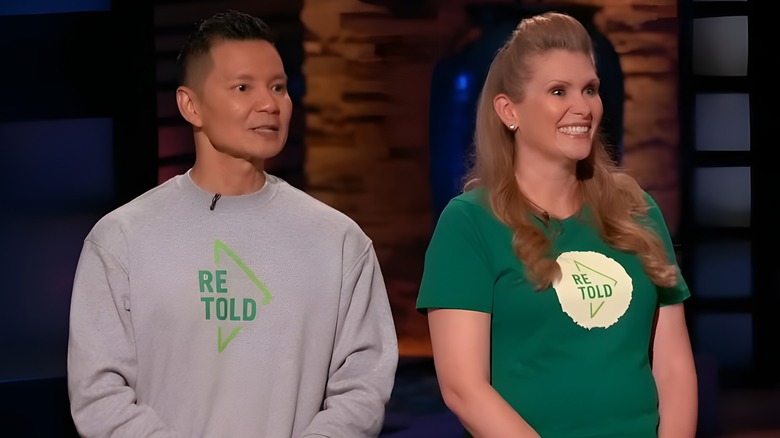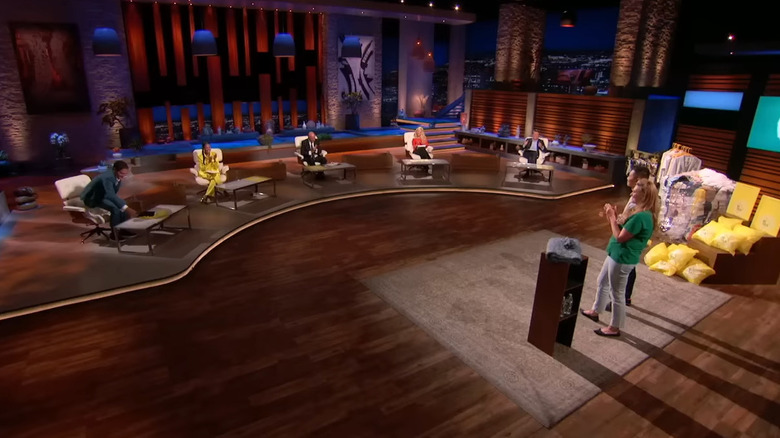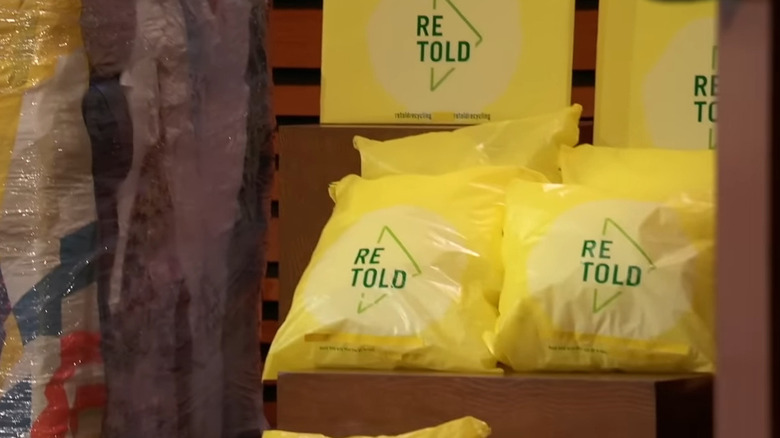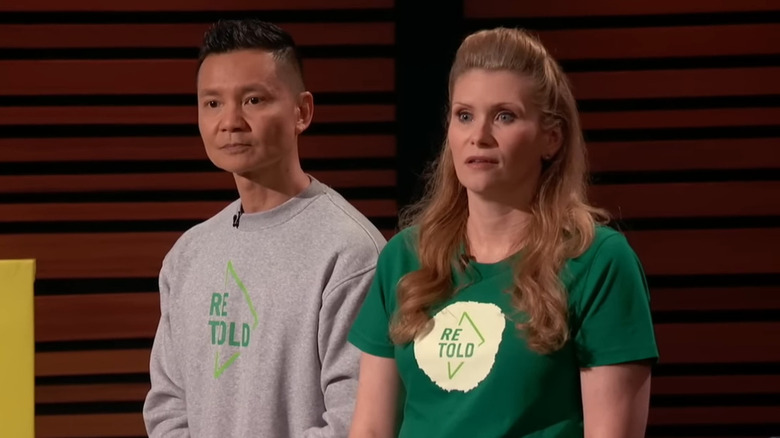Whatever Happened To Retold Recycling After Shark Tank?
Recent seasons of "Shark Tank" have begun to see an uptick of companies such as IncrEdible Eats and Project Pollo that have pitched sustainable efforts to the show's panel of wealthy celebrity investors. This was a similar case for Amelia Trumble and Alan Yeoh, who birthed the brand Retold Recycling with the intent of helping people think differently about where their clothes goes. Customers collect their unused clothing and textiles into a prepaid labeled bag ordered from the company that can be delivered through the post office or mailroom. Retold ensures that your items are distributed through sustainable outlets such as thrift stores and textile recyclers.
Retold Recycling got its start in 2020 when Trumble was having a hard time trying to figure out what to do with her cluttered apartment closet full of clothes. Even though she could give away some her clothing to Goodwill, items such as used underwear and socks were unable to be donated. From there, Trumble and business partner Noelle Sadler Delory, who does not appear in the "Shark Tank" segment, got to thinking about what would eventually become Retold Recycling. They later brought Yeoh on board, with all three having had experience working under MAC Cosmetics in various executive and directorial positions.
The team began seeing great success with the concept, with a healthy growth rate in sales and a wide span of users nationwide. However, they are ultimately in it for making a positive impact to the world around them. So, can a shark help them continue to go green while also making some green?
What happened to Retold Recycling on Shark Tank?
"Shark Tank" Season 14 saw Amelia Trumble and Alan Yeoh pitch their company Retold Recycling with hopes of receiving an investment of $300,000 for a 15% equity stake. After sharing their idea, the sharks are curious regarding the demand for this kind of service. The team informs them that there is a growing amount of interest regarding what to do with unwanted clothing.
Trumble dives deeper into their business model, explaining that customers buy one of their bags for $14.50 before filling it with their clothes and sending it off. The sharks find some concern with this, believing that consumers would prefer taking the time to drive to Goodwill as opposed to paying that much for a bag. Trumble states that they haven't had much pushback on this factor given the convenience their service offers.
Their sales have seen healthy growth, going from $12,000 in 2020 to projections of $500,000 by the end of 2022. This is largely contributed to their partnership with companies looking for sustainable solutions. They are currently partnered with one brand and have another one planned to launch soon. Since a good chunk of their revenue is eaten up by shipping costs, the team hope that scaling will allow them to open up more shipping centers throughout the country, especially on the west coast where most of their customer base is.
Almost all the sharks go out, with most of them not seeing a conceivable way that they'd make their money back. However, Mark Cuban thinks there's potential in placing Retold's bags in locations such as dry cleaners and 7-Eleven stores. He proposes a non-negotiable deal for $300,000 at 25% equity, which the two eventually accept.
Retold Reycycling after Shark Tank
Like many businesses that appeared on the show, Retold Recycling saw a surge in traffic to their website and social media platforms, a phenomenon commonly referred to as the "Shark Tank" effect. Co-founders Amelia Trumble and Alan Yeoh took to Instagram to welcome their new visitors, with Trumble saying, "We just wanted to say a huge thank you for all of the love and support we've received since out episode aired. We've received so many orders and emails from customers so please bear with our team as we work through the backlog."
The team shared that their next steps would be to grow their pool of retail and brand partners. Their deal with Mark Cuban was successfully able to close and Trumble was delighted with the partnership, saying in a PR statement, "Despite plenty of drama in the Tank, Mark seemed to be able to cut through the noise and immediately understood our vision and how we could scale. His past history of betting on solutions that help society at large meant that we knew he was the perfect Shark for us!" His help allowed the company to find new affiliates in Los Angeles, a key spot for much of Retold's audience.
Is Retold Recycling still in business?
Those looking to take their first steps to sustainably disposing of their clothes have plenty of options with Retold Recycling. Their website allows visitors to choose between purchasing a single, three pack, or ten pack of bags depending on the amount of clothes being thrown out. Retold also offers quarterly and annual subscription services for those looking to make recycling a regular habit.
As discussed on "Shark Tank," the Retold Recycling team have also included business initiatives to their list of services in an effort to get more brands thinking sustainably. The agreement allows customers to purchase one of Retold's bags and print the label from the partnered company's website. This not only gets Retold more exposure, but it bestows an environmentally-conscious image on the other brands. Some of Retold's current affiliates include Verizon, Hines, and Vitamin A.
Retold's mission to spread awareness on its green efforts have spanned far and wide. On top of remaining active on Instagram and Facebook, the team have appeared at events such as the Rags to Riches Textile Upcycling Summit. Additionally, Retold has been included on platforms such as CNN, Shoutout LA, Bustle, and Women's Wear Daily. The company is estimated to have a net worth of $1.2 million.
What's next for Retold Recycling?
Retold Recycling may not be breaking any "Shark Tank" records, but that hardly seems to be a qualifier for their success. At its core, Retold Recycling aims to shift public perception about the little ways they can live more sustainably. In doing so, the brand is not only trying to be at the forefront of this conversation but is also finding other ways to increase public awareness.
Speaking with Angeleno in July, co-founder Amelia Trumble shared the bright road ahead for Retold's future. "We should hopefully have our first pack of bags for sale in retail stores by the end of this year," she shared. "We are also working on two new bag products and international expansion (although this is a longer play)." With this growth, Trumble and company hope for Retold to have immediate recognition amongst the public, with Trumble continuing, "We are VERY excited to get Retold bags into the hands of many more customers and to become synonymous with textile recycling. We want to be a verb, a.k.a. 'to Retold' is to send your clothes for recycling!"
Even then, Retold is using its platform to strengthen other voices in the fight for sustainability. The company's website includes a page for a "Sustainable Store," which highlights products from other environmentally-conscious small businesses favored by the Retold team. The recommended items range from deodorants to potted plants. For many, it's not easy to find ways to go green, but Retold is on the cusp of making this an everyday mindset.



